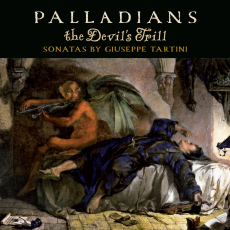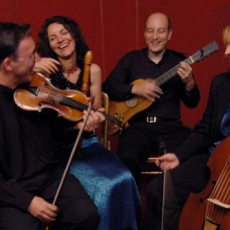Giuseppe Tartini - Palladians - SA-CD.net
Hot off the presses, this is a wonderful disc of Tartini and Veracini from the Palladians.
Including easily the most famous piece that Tartini wrote, "The Devil's Trill" sonata, perhaps the most remarkable piece is the companion "Didone abbandonata". As the lutenist William Carter writes in his - as ever - excellent notes, the sonata that invokes Dido's overwhelming feelings of loss is all the more involving and musically more exciting than the more outwardly virtuoso "Devil's Trill". Following these works is an example of Veracini - a composer to have a lasting impact on Tartini himself - the variety and extremes of styles of playing employed pre-date Paganini in mood (and range on the fingerboard but not difficulty execution) and it is almost a text book of developments in violin playing for the subsequent century. The disc then returns to Tartini, with two excerpts framing his "Pastorale" sonata which, with the G and D strings now tuned to A and E, lends a remarkably fresh sound to the violin and allows superb mimicry of both pipes and tambour. The excerpts are two slow movements for two players, a Largo for violin and viol and a Grave for viol with archlute accompaniment.
There is another account of "The Devil's Trill" available (Carmen Fantasie - Anne-Sophie Mutter) but this is in an arrangement by Riccardo Zandonai that includes a grand piano, cadenza in a completely different musical style and, for all of Mutter's extraordinarily impassioned playing, cannot be recommended to those who have even the tiniest leanings towards HIP. Here, Rodolfo Richter is both sensitive and fully alive to the virtuoso demands placed upon the player and is wonderfully accompanied by the other members of Palladians; Susanne Heinrich (viol; tacet in "Didone abbandonata"), Silas Standage (harpsichord; tacet in the Largo, Grave and "Pastorale") and William Carter (archlute; baroque guitar in the Pastorale; tacet in the Largo). He is equally expressive in the following sonatas, with some dazzling playing in the faster movements of the Veracini as well as demonstrating a most relaxed bowing technique in the contemplative moments of the same work.
Heinrich is given her own chance to shine in the two slow movements and takes it with great aplomb - I hope that she will be given a wider opportunity to display her wonderful musicianship in future. The Largo is given a sensuous reading by both Richter and Heinrich, with the lines intertwining in a continual dialogue that speaks of a melancholic love but the Grave that closes the disc is one of those moments in recordings that just transports the listener to another plane altogether with rapt playing and is worth the price of the disc alone. Throughout, Carter is the ever sensitive and consummate musician and Standage's playing is on a par with the others (although this repertoire gives the harpsichord a quieter role).
[On receiving the disc, I did wonder why the Palladian Ensemble had transformed into the Palladians. It seems that all the original members except Carter have moved on and that on the departure of Pamela Thorby, the ensemble decided that a more flexible approach would allow players to be included as and when required to suit the music rather than, by implication, fitting the music to the ensemble - something, having heard their Rebel/Marais disc, I fully support.]
The sound, recorded as usual for this ensemble in St Andrew's Church (Toddington, UK) is an ideal blend of clarity and space and very truthful to the acoustic and is a new high for the engineering team from Linn.
Highly recommended.

